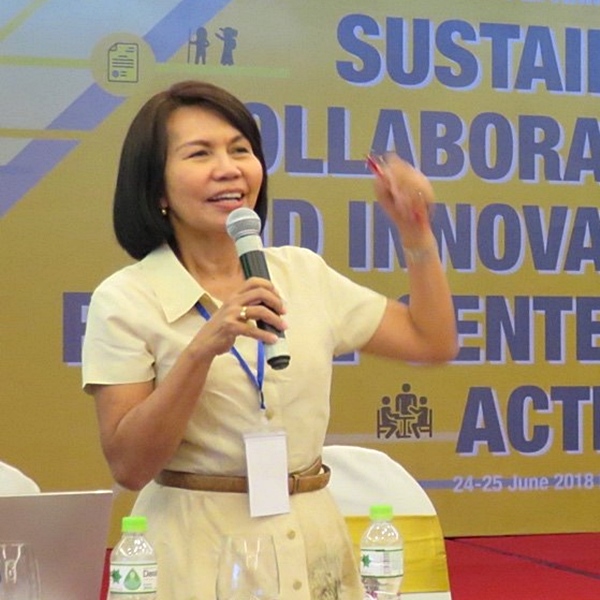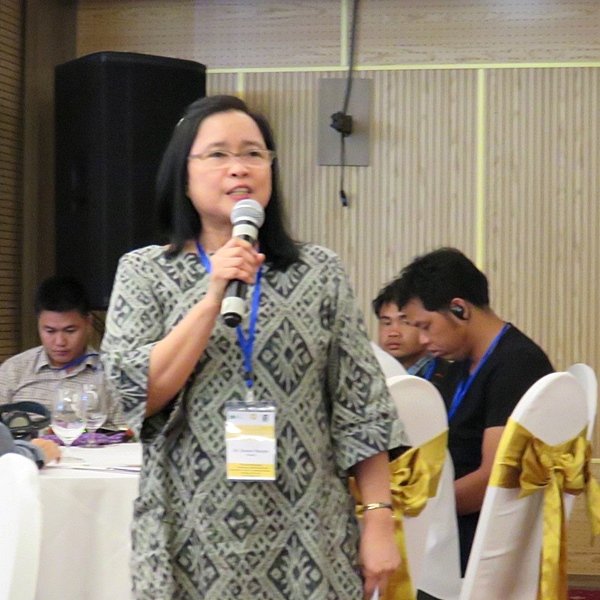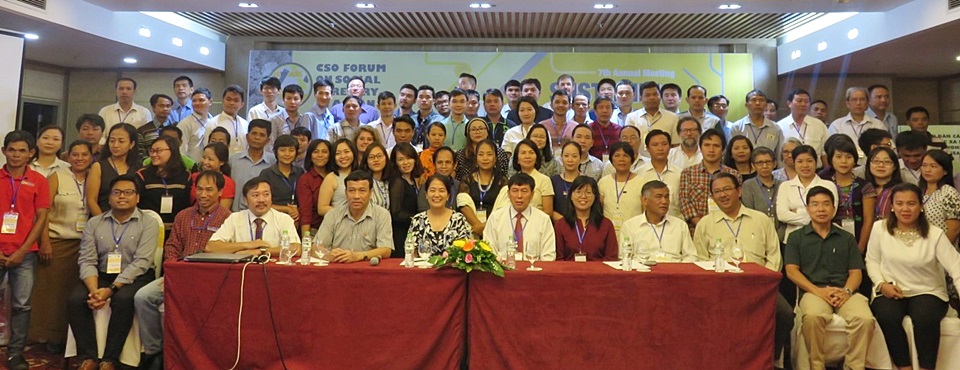Ms. Femy Pinto, Executive Director of NTFP-EP Asia, in the opening session, gave a brief overview of the forum and its overall objective, which is to discuss, distill, consolidate, and elevate messages and learnings of CSOs, indigenous people's organizations (IPOs), and people's organizations (POs), and smallholders on social forestry and climate change.
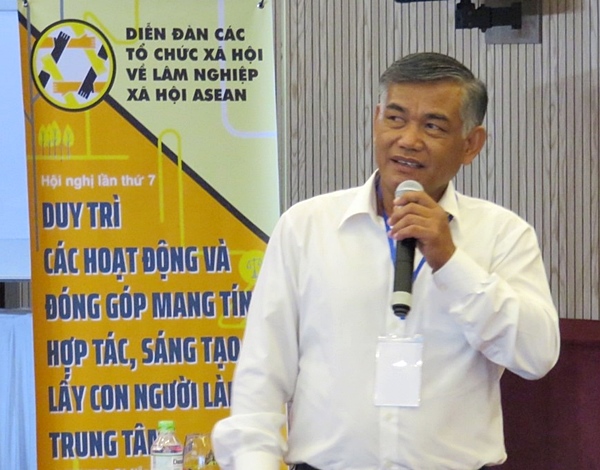 The Deputy Director of the Village Forestry and NTFP Management Division, Department of Forestry and AWG-SF Focal Point of Lao PDR, Mr. Somsack Sysomvang, presented a paper on Potential Developments and Initiatives in Small Holder/Community-based NTFP Enterprises and Market Support (Case of wild honey/beekeeping development in Lao PDR). According to Mr. Sysomvang, the government of Lao PDR recognizes that NTFP, honey in particular, can clearly demonstrate the linkages between forest management, environmental protection, and local livelihood development. He emphasized the importance of honey in providing supplementary income to farmers and as local medicine and food. At least 1,200 tons of forest honey can be produced in the protected forests of Lao PDR, valued at USD 5.19 Million, at the local level. In conclusion, he underscored that supporting the NTFP development program with components of capacity building for farmers and forest collectors; market research and awareness raising on the benefits of sustainable NTFP harvest and collection practices; and networking with experts, practitioners, and actors will produce concrete benefits and good results for social forestry practice in the country.
The Deputy Director of the Village Forestry and NTFP Management Division, Department of Forestry and AWG-SF Focal Point of Lao PDR, Mr. Somsack Sysomvang, presented a paper on Potential Developments and Initiatives in Small Holder/Community-based NTFP Enterprises and Market Support (Case of wild honey/beekeeping development in Lao PDR). According to Mr. Sysomvang, the government of Lao PDR recognizes that NTFP, honey in particular, can clearly demonstrate the linkages between forest management, environmental protection, and local livelihood development. He emphasized the importance of honey in providing supplementary income to farmers and as local medicine and food. At least 1,200 tons of forest honey can be produced in the protected forests of Lao PDR, valued at USD 5.19 Million, at the local level. In conclusion, he underscored that supporting the NTFP development program with components of capacity building for farmers and forest collectors; market research and awareness raising on the benefits of sustainable NTFP harvest and collection practices; and networking with experts, practitioners, and actors will produce concrete benefits and good results for social forestry practice in the country.
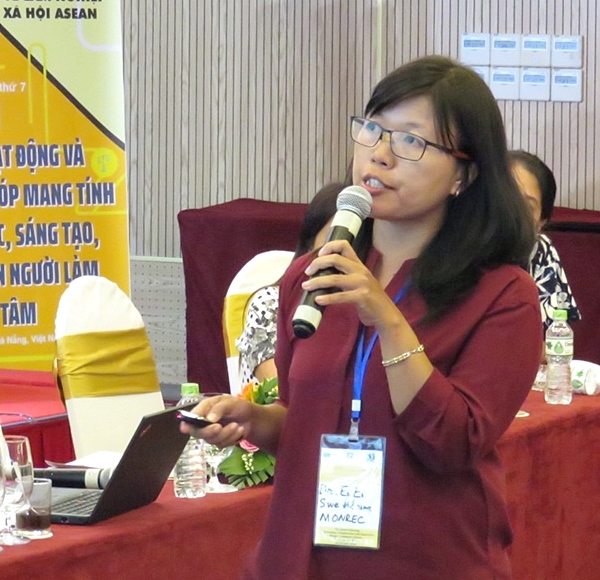 Dr. Ei Ei Swe Hlaing, Assistant Director of Forest Research Institute, Forest Department, Ministry of Natural Resources and Environmental Conservation and AWG-SF Focal Point of Myanmar, discussed the topic Experience of National Multi-stakeholder Community Forestry Working Group in Myanmar. Dr. Ei Ei highlighted that Community Forestry was initiated in Myanmar in 1995 as one of the approaches in decentralizing forest management--- an alternative to centralized and top down approaches to mitigate deforestation and forest degradation. The area of community forestry had rapidly increased since 2014 and became a high national priority. Furthermore, Dr. Ei Ei underscored the importance of strengthening the link between the Community Forestry National Working Group (CFNWG) and the Community Forestry Unit at the national level, in the implementation of the new Community Forestry Instructions 2016. The CFNWG is composed of relevant government agencies and CSOs that can influence decisions on forest governance. Through the working group, the traditional process of coordination is supplemented by more interactive and participatory approaches. This was demonstrated in revisiting the Community Forestry Instructions (2016), strengthening of regional level community forestry unit, development of community forest enterprise, and evaluation of community forestry implementation.
Dr. Ei Ei Swe Hlaing, Assistant Director of Forest Research Institute, Forest Department, Ministry of Natural Resources and Environmental Conservation and AWG-SF Focal Point of Myanmar, discussed the topic Experience of National Multi-stakeholder Community Forestry Working Group in Myanmar. Dr. Ei Ei highlighted that Community Forestry was initiated in Myanmar in 1995 as one of the approaches in decentralizing forest management--- an alternative to centralized and top down approaches to mitigate deforestation and forest degradation. The area of community forestry had rapidly increased since 2014 and became a high national priority. Furthermore, Dr. Ei Ei underscored the importance of strengthening the link between the Community Forestry National Working Group (CFNWG) and the Community Forestry Unit at the national level, in the implementation of the new Community Forestry Instructions 2016. The CFNWG is composed of relevant government agencies and CSOs that can influence decisions on forest governance. Through the working group, the traditional process of coordination is supplemented by more interactive and participatory approaches. This was demonstrated in revisiting the Community Forestry Instructions (2016), strengthening of regional level community forestry unit, development of community forest enterprise, and evaluation of community forestry implementation.
SEARCA, as one of the partners of ASFCC, likewise supported the CSO Forum. Ms. Carmen Nyhria G. Rogel, Program Specialist of the Research and Development Department (RDD), served as moderator of the session on Forest Tenure and Access Rights. Dr. Bessie M. Burgos, Program Head for Research and Development, in a short message during the closing program of the CSO Forum, emphasized the continuing support of SEARCA-ASRF to the initiatives and vision of the CSO forum in accordance with the Plan of Action of the AWG-SF and the ASFCC goals. (Xyrus Godfrey B. Capiña)
